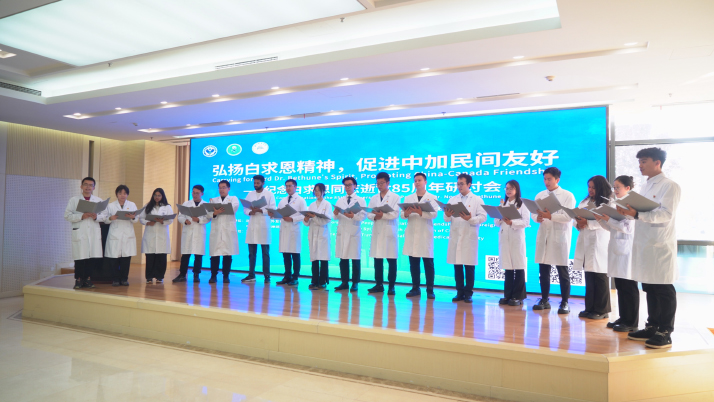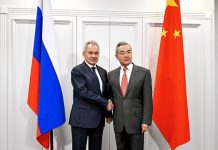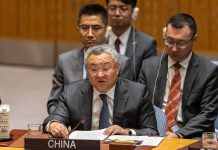‘What kind of spirit is this that makes a foreigner selflessly adopt the cause of the Chinese people’s liberation as his own? It is the spirit of internationalism, the spirit of communism, from which every Chinese Communist must learn.” At a hall in Beijing Tiantan Hospital, Capital Medical University on the morning of November 12, a dozen doctors made this recitation as part of an event in memory of Canadian physician Norman Bethune (1890-1939), who helped China during the Chinese People’s War of Resistance Against Japanese Aggression (1931-45).
The eulogy was written by Chairman Mao Zedong (1893-1976) in 1939, the year Bethune died of septicemia after accidentally cutting himself while performing surgery on a Chinese soldier. Since then, Bethune has become a household name in China and a symbol of international solidarity with the Chinese people in their fight against Japanese aggression.
A noble-minded man
Bethune was born in 1890 in Ontario, Canada. He studied medicine at the University of Toronto and became known for his pioneering work in the field of surgery, especially in blood transfusion techniques.
During his early medical career, he worked in Canada, the U.S., France and other countries. Bethune was deeply influenced by his experience in World War I, during which he worked as a surgeon treating soldiers on the front lines. It was during this period that he became interested in revolutionary causes.
In 1935, Bethune became a member of the Communist Party of Canada. The year after, when the German and Italian fascist bandits invaded Spain, he went to the front and worked for the anti-fascist Spanish people.
In early 1938, during the height of the Chinese People’s War of Resistance Against Japanese Aggression, Bethune was sent by the communist parties of Canada and the United States to China to provide medical support to soldiers and civilians affected by the war. At the time, China was struggling against the brutal invasion of Japanese forces, and medical supplies and expertise were desperately needed.
Bethune arrived at Yan’an, the seat of the Communist Party of China Central Committee, on March 31, 1938. He quickly immersed himself in the work of treating the wounded and sick in difficult, often dangerous conditions. That summer, Bethune volunteered to save lives on the front lines in the Shansi-Chahar-Hopei border area in north China. In his first month at the battlefield, he healed 147 wounded soldiers. During one battle, he worked 69 consecutive hours and conducted 115
surgeries.
He was not only a doctor but also a passionate advocate for improving medical care in rural China. During his time in north China, he helped build a sample clinic and a medical school, training local Chinese doctors and nurses. He also created a makeshift hospital on horseback, which could hold equipment and medicine for 100 surgeries. He developed portable blood transfusion techniques that could be used on the battlefield to treat wounded soldiers, something that was revolutionary at the time.
Thanks to his efforts, wounded soldiers were saved on the frontline more quickly than ever before. And he had also won the heart of the Chinese people. “No one who returned from the front failed to express admiration for Bethune whenever his name was mentioned, and none remained unmoved by his spirit,” wrote Mao.
Unfortunately, Bethune’s time in China was short. Despite attempts to treat the septicemia, he died on November 12, 1939, at the age of 49.
Bethune’s death deeply saddened the Chinese people. His sacrifices and selfless dedication made him a hero cherished by the Chinese people. He was hailed as “a man of moral integrity and above vulgar interests and a man who is of value to the people” by Mao.

Bridging China and Canada
Bethune became a symbol of international solidarity and medical humanitarianism in China. Monuments, museums, and hospitals were named after him in the country. Events are held to remember him on the anniversary of his death. His life and work have also been celebrated in Chinese literature, film, and art. In addition to Mao’s essay, there have been numerous Chinese-language books, documentaries and plays about his life.
Today, Bethune’s story is taught in Chinese schools as an example of foreign friendship and solidarity, and his legacy continues to inspire people both in China and around the world, especially those in the fields of medicine and humanitarian work.
Douglas Prescott is a senior consultant at AKD International Inc., a Canadian education company that operates more than 10 international schools in China, and has been living and working in China for more than a decade. While attending the memorial event at Beijing Tiantan Hospital, Prescott said throughout his extensive travels around China, he has experienced the warmth and love the Chinese people feel for Bethune and today’s Canadians. “His spirit lives on because of his legacy.”
Bethune’s contributions have created a shared legacy between China and Canada. “He is a bridge and a bond for Sino-Canadian people-to-people exchange. Today, we commemorate him not only for his deeds and contributions, but also for cementing the friendship between the two peoples, so as to pass the friendship on from generation to generation,” Zhang Qian, Executive Vice President of Beijing People’s Association for Friendship With Foreign Countries, said at the event.
During the event, Prescott highlighted the importance of celebrating legacies such as Bethune’s in maintaining positive international relations, saying that strong cultural and people-to-people exchange always makes a positive impact, regardless of the geopolitical situation.
The event was sponsored by Beijing People’s Association for Friendship With Foreign Countries and the Chinese Bethune Spirit Research Association. Over 100 guests, including descendants of Bethune’s colleagues, doctors of Beijing Tiantan Hospital, and international students, were present. –The Daily Mail-Beijing Review news exchange item






